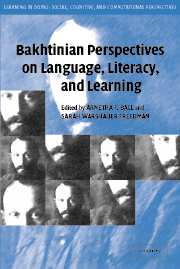Book contents
- Frontmatter
- Contents
- List of Contributors
- Acknowledgments
- PART I IDEOLOGIES IN DIALOGUE: THEORETICAL CONSIDERATIONS
- 1 Ideological Becoming: Bakhtinian Concepts to Guide the Study of Language, Literacy, and Learning
- 2 Dewey and Bakhtin in Dialogue: From Rosenblatt to a Pedagogy of Literature as Social, Aesthetic Practice
- 3 Intertextualities: Volosinov, Bakhtin, Literary Theory, and Literacy Studies
- 4 The Teaching of Academic Language to Minority Second Language Learners
- Voices in Dialogue – Dialoguing About Dialogism: Form and Content in a Bakhtinian Dialogue
- PART II VOICED, DOUBLE VOICED, AND MULTIVOICED DISCOURSES IN OUR SCHOOLS
- PART III HETEROGLOSSIA IN A CHANGING WORLD
- PART IV A CLOSING THOUGHT ON BAKHTINIAN PERSPECTIVES
- Author Index
- Subject Index
- Titles in the series
- References
Voices in Dialogue – Dialoguing About Dialogism: Form and Content in a Bakhtinian Dialogue
Dialoguing About Dialogism: Form and Content in a Bakhtinian Dialogue
Published online by Cambridge University Press: 24 May 2010
- Frontmatter
- Contents
- List of Contributors
- Acknowledgments
- PART I IDEOLOGIES IN DIALOGUE: THEORETICAL CONSIDERATIONS
- 1 Ideological Becoming: Bakhtinian Concepts to Guide the Study of Language, Literacy, and Learning
- 2 Dewey and Bakhtin in Dialogue: From Rosenblatt to a Pedagogy of Literature as Social, Aesthetic Practice
- 3 Intertextualities: Volosinov, Bakhtin, Literary Theory, and Literacy Studies
- 4 The Teaching of Academic Language to Minority Second Language Learners
- Voices in Dialogue – Dialoguing About Dialogism: Form and Content in a Bakhtinian Dialogue
- PART II VOICED, DOUBLE VOICED, AND MULTIVOICED DISCOURSES IN OUR SCHOOLS
- PART III HETEROGLOSSIA IN A CHANGING WORLD
- PART IV A CLOSING THOUGHT ON BAKHTINIAN PERSPECTIVES
- Author Index
- Subject Index
- Titles in the series
- References
Summary
In his essay, Discourse in the Novel, Bakhtin claims that all kinds of discourse are “oriented toward an understanding that is ‘responsive’” (Bakhtin, 1981, p. 280). This is one of his core ideas: that the meaning of any utterance, whether spoken or written, can only be understood in a particular context and “against the background of other concrete utterances on the same theme” (p. 281). Although he acknowledges the importance of studying external dialogue, or spoken exchanges between people, he also introduces the concept of “internal dialogism.” Bakhtin explains that words are shaped by the answer their speaker anticipates, so they are in a constant internal dialogue with their imagined rejoinder. Words are also internally dialogic because they can never fully encompass the object to which they refer, so they are in constant dialogue with the “alien word that is already in the object” (p. 279). Finally, words are in constant internal dialogue with “the subjective belief system of the listener” (p. 282). They cannot create meaning without this context.
Early in our course on Bakhtin, I came to recognize the presence of these forms of dialogism in spoken and written language, and I began to wonder how forms of academic writing might better capture or acknowledge them. I was excited to participate in e-mail exchanges with the authors in this section because the form of these exchanges seemed to reflect the content of Bakhtin's ideas so well.
Information
- Type
- Chapter
- Information
- Bakhtinian Perspectives on Language, Literacy, and Learning , pp. 99 - 104Publisher: Cambridge University PressPrint publication year: 2004
References
Accessibility standard: Unknown
Why this information is here
This section outlines the accessibility features of this content - including support for screen readers, full keyboard navigation and high-contrast display options. This may not be relevant for you.Accessibility Information
- 1
- Cited by
